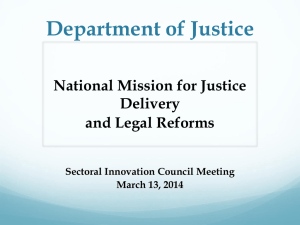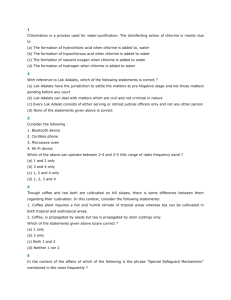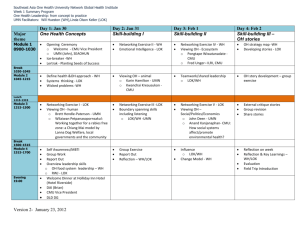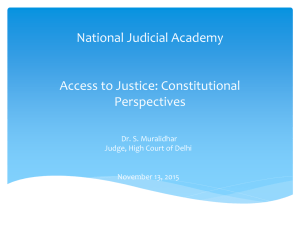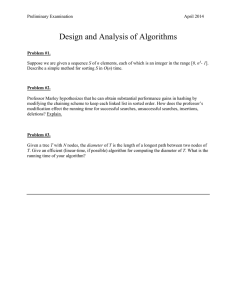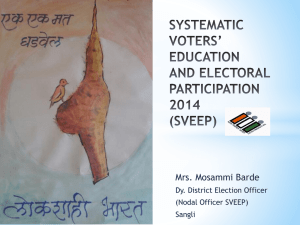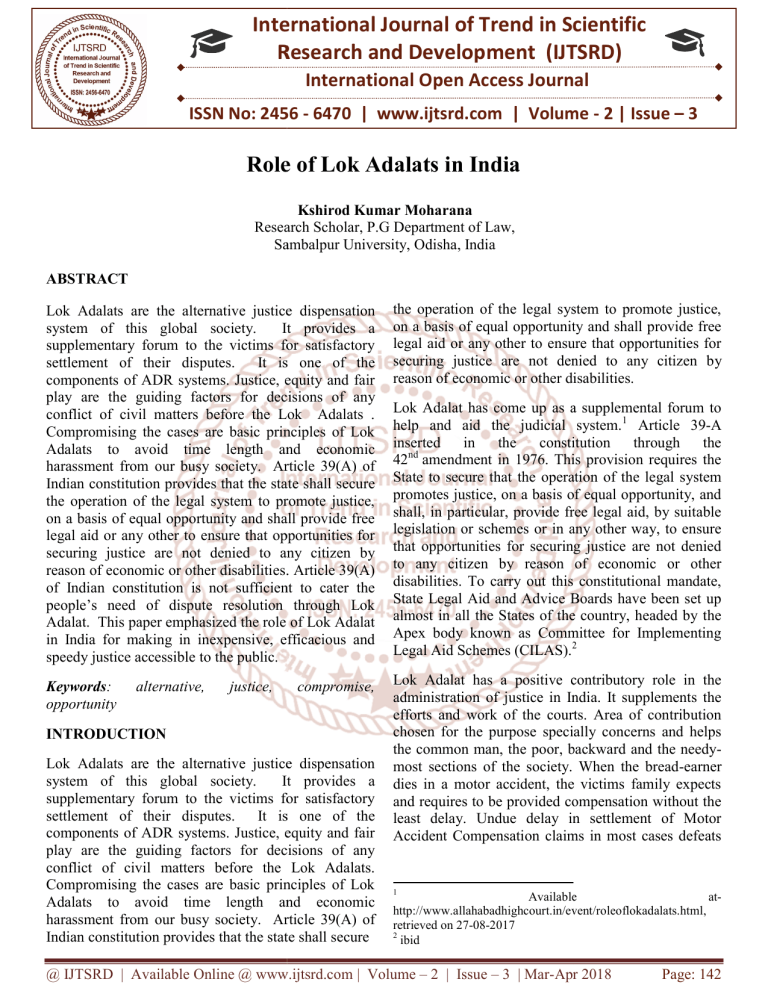
International Journal of Trend in Scientific Research and Development (IJTSRD) International Open Access Journal ISSN No: 2456 - 6470 | www.ijtsrd.com | Volume - 2 | Issue – 3 Role of Lok Adalats in India Kshirod Kumar Moharana Research Scholar, P.G Department of Law, Sambalpur University, Odisha Odisha, India ABSTRACT Lok Adalats are the alternative justice dispensation system of this global society. It provides a supplementary forum to the victims for satisfactory settlement of their disputes. It is one of the components of ADR systems. Justice, equity and fair play are the guiding factors for decisions of any conflict of civil matters before the Lok Adalats . Compromising the cases are basic principles of Lok Adalats to avoid time length and economic harassment from our busy society. Article 39(A) of Indian constitution provides that the state shall secu secure the operation of the legal system to promote justice, on a basis of equal opportunity and shall provide free legal aid or any other to ensure that opportunities for securing justice are not denied to any citizen by reason of economic or other disabilities. es. Article 39(A) of Indian constitution is not sufficient to cater the people’s need of dispute resolution through Lok Adalat. This paper emphasized the role of Lok Adalat in India for making in inexpensive, efficacious and speedy justice accessible to the public. the operation of the legal system to promote justice, on a basis of equal opportunity and shall provide free legal aid or any other to ensure that opportunities for securing justice are not denied to any citizen by b reason of economic or other disabilities. Keywords:: opportunity Lok Adalat has a positive contributory role in the administration of justice in India. It supplements the efforts and work of the courts. Area of contribution chosen for the purpose specially concerns and helps the common man, thee poor, backward and the needyneedy most sections of the society. When the bread-earner bread dies in a motor accident, the victims family expects and requires to be provided compensation without the least delay. Undue delay in settlement of Motor Accident Compensation on claims in most cases defeats alternative, justice, compromise, INTRODUCTION Lok Adalats are the alternative justice dispensation system of this global society. It provides a supplementary forum to the victims for satisfactory settlement of their disputes. It is one of the components of ADR systems. Justice, equity and fair play are the guiding factors for decisions of any conflict of civil matters before the Lok Adalats. Compromising the cases are basic principles of Lok Adalats to avoid time length and economic harassment from our busy society. Article 39(A) of Indian constitution ion provides that the state shall secure Lok Adalat has come up as a supplemental forum to help and aid the judicial system.1 Article 39-A inserted in the constitution through the 42nd amendment in 1976. This provision requires the State to secure that the operation of the legal system promotes justice, on a basis of equal opportunity, and shall, in particular, provide free legal aid, by suitable legislation or schemes or in any other way, to ensure that opportunities for securing justice are not denied to any citizen by reason of economic or other disabilities. To carry out this constitutional mandate, State Legal Aid and Advice Boards have been set up almost in all the States of the country, headed by the Apex body known as Committee for Implementing Legal Aid Schemes (CILAS).2 1 Available atat http://www.allahabadhighcourt.in/event/roleoflokadalats.html, http://www.allahabadhighcourt.in/event/roleoflokadalats.html retrieved on 27-08-2017 2 ibid @ IJTSRD | Available Online @ www.ijtsrd.com | Volume – 2 | Issue – 3 | Mar-Apr Apr 2018 Page: 142 International Journal of Trend in Scientific Research and Development (IJTSRD) ISSN: 2456-6470 the very core of the purpose. It is in this area that Lok Adalat is rendering very useful service to the needy. regular courts and the problem of improvement and reform of civil judicial system is urgently needed. 5 The Lok Adalat resolves disputes relating to matters which are not very complicated in nature. it have been playing an important role in the resolution of disputes relating to compensation claims, cases regarding distribution, claims against the Insurance Corporation and matters relating to marriages. While the Urban and elite may be in a position to afford the present system to some extent, restructuring of judicial system, at grass root level it is necessary to achieve goals of social, economic and political justice. For this purpose, Mahatma Gandhi expressed that-6 Lok Adalat not only provides relief to the common man by way of early disposal of the matter but also saves the time and heavy expense involved in litigation. There is no question of execution, appeal or revision proceedings or any other incidental off shoot of the litigation when the matter is settled through compromise at the Lok Adalat. Disposal through compromise brings an end to the old subsisting tension and bitterness and promotes amity, goodwill and welfare amongst the litigating parties, also to the benefit of the society as a whole. CONSTITUTIONAL MANDATE During Ancient Times there was no regular hierarchy of courts and the organize system was yet to come. Disputes were therefore settled through the mechanism of people's forums which were not official courts but used to enjoy the privileged, esteem, respect and degree of obedience from the people. The system had its own advantages. There were no technicalities. There were no procedural hurdles. The persons presiding over lok Adalats were from the local village and hence the implementation of decisions was without much resistance. In those days communication and transport was in much primitive stage and hence the people preferred to sort-out the disputes at local level. The courts were guided by scriptures, principles of good conscience, fairness and public convenience.3 Lok Adalats provide a forum to the parties to reach a mutually agreed settlement by conciliation and involvement of mediators. The movement during its present initial stage is too nebulous, sporadic and populist.4 Lok Adalats can succeed only if people are willing to compromise and come to a mutual settlement. Contested matters have to be tried in “Today the poor and disadvantaged are cut off from the legal system – they are functional outlaws not only because they are priced out of judicial system by reason of its expensiveness and dilatoriness but also because of the legal and judicial system. They have distrust and suspicion on the law, the low courts and the lawyers for several reasons. There is an air of excessive formalism in law courts which over owes them and sometimes scares them. They are completely mystified by the Court proceedings and this to a large extent alienates them from the legal and judicial process. The result is that it has failed to inspire confidence in the poor and they have little faith in it a capacity to do justice.” The modern version of Lok Adalat has thus arisen out of the concern expressed by the committees set up to resort on organization legal aid to the needy and poor people and alarm generated by judicial circle on mounting arrears of pending cases at different levels in Court system.7 The Committee for Implementing Legal Aid Schemes (CILAS) appointed by the Union Government, in 1980 under the Chairmanship of the then Chief Justice Shri P. N. Bhagwati gave an impetus and encouragement to the legal aid movement in general and legal aid camps and Lok Adalats in particular. 8 To sum up, there is unanimous opinion that Lok Adalats are the need of time to provide speedy and inexpensive justice. Though the states have framed their own rules and regulations governing the Lok Adalats, mainly the following categories of matters can be entertained.9 5 3 Lok Adalats as Unofficial Courts During Ancient Times, available at http://webcache.googleusercontent.com/search?q=cache:http://sh odhganga.inflibnet.ac.in/bitstream/10603/59725/14/14_chapter% 25209.pdf 4 M.P.Jain , Indian Legal History, , Page 265. .Madhava Menon, Lok Adalat, People’s Programme For Speedy Justice, Bar Council Journal, 1986 Page 129. 6 Mahatma Gandhi, Quoted In Juridicare Equal Justice, Social Justice Report 1977. 7 Report Of Gujarat Legal Aid Committe (1971) 8 CILAS Report, 1980 9 Lok Sabha Unstarred Question Dated 18/03/1986. @ IJTSRD | Available Online @ www.ijtsrd.com | Volume – 2 | Issue – 3 | Mar-Apr 2018 Page: 143 International Journal of Trend in Scientific Research and Development (IJTSRD) ISSN: 2456-6470 (a) Pre-litigation (b) Pending cases (c) Legal Advice for general guidance The analysis of statistics of various cases shows that the Lok Adalats have mainly dealt with the following areas -10 (a) Civil and Property Disputes (b) Adjudication of insurance claims Civil Disputes (c) Motor Accidents (d) Labour (e) Matrimonial (f) Special Laws (g) Land Acquisition (h) Compoundable Criminal offences It is appreciated that in most of the matters, the litigants mainly come from poor and middle class families and humanitarian aspects are also involved. By persuading both the parties to reconcile through able counselors including lawyers, law teachers, social workers and eminent public persons, the matters can be decided quickly. The advent of Legal Services Authorities Act, 1987 gave a statutory status to Lok Adalats, pursuant to the constitutional mandate in Article 39-A of the Constitution of India. According to this article, The State shall secure that the operation of the legal system promotes justice, on a basis of equal opportunity, and shall, in particular, provide free legal aid, by suitable legislation or schemes or in any other way, to ensure that opportunities for securing justice are not denied to any citizen by reason of economic or other disabilities. The Legal service Authorities Act was enacted to constitute legal services authorities to provide free and competent legal services to the weaker sections of the society and to organize Lok Adalats to secure that the operation of the legal system promotes justice on the basis of equal opportunity. The settlement of disputes by the Panchayats or tribal heads was prevalent since ancient times. When statutory 10 Legal Aid Newsletter, May-August 1987, Page 1. recognition was given to Lok Adalat, it was specifically provided that the award passed by the Lok Adalat will have the force of decree of a court which can be executed as a civil court decree. The Lok Adalat is usually presided over by a sitting or retired judicial official as the chairman with two other members, a lawyer and a social worker. It has been observed through experience that cases involving monetary disputes are easily settled through Lok Adalats. Therefore, most motor road accident disputes are brought to Lok Adalats. The primary condition of the Lok Adalat is that both parties in dispute should consent to the settlement. It is necessary that the parties involved in the dispute are whole-heartedly involved in the justice dispensing system and do abide by the decision given by the Lok Adalat. There is no court fee. If the case is already filed in the regular court, the fee paid will be refunded if the dispute is settled at the Lok Adalat. The procedural laws and the Evidence Act are not strictly followed while assessing the merits of the claim presented to the Lok Adalat. The decision of the court is binding on the parties to the dispute and its order is capable of execution through legal process. No appeal lies against the decision of the court.11 Every Lok Adalat shall have the power to specify its own procedure for the determination of any dispute coming before it.12 All proceedings before a Lok Adalat shall be deemed to be judicial proceedings within the meaning of Sections 193, 219 and 228 of IPC.13 Every Lok Adalat shall be deemed to be a Civil Court for the purpose of Sec 195 and Chapter XXVI of Cr.P.C.14 During the Lok Adalat, the parties agree to abide by the decision of the judge at the Lok Adalat. However, it has been seen that the same order is challenged on several grounds. In one of the recent cases, the Supreme Court of India has once again laid to rest all such doubts. In unequivocal terms, the Court held that the award of the Lok Adalat is as good as the decree of the Court. The award passed by the Lok Adalat is 11 Available at-http://kelsa.nic.in/lokadalat.htm, retrived on 2708-2017 12 Available athttp://ihra.co.in/upload/index.php?mod=article&cat=Activities& article=8, retrieved on 27-08-2017 13 ibid 14 Available athttp://ihra.co.in/upload/index.php?mod=article&cat=Activities& article=8, retrieved on 27-08-2017 @ IJTSRD | Available Online @ www.ijtsrd.com | Volume – 2 | Issue – 3 | Mar-Apr 2018 Page: 144 International Journal of Trend in Scientific Research and Development (IJTSRD) ISSN: 2456-6470 the decision of the Court itself though arrived at by the simpler method of conciliation instead of the process of arguments in court. The most important factor to be considered while deciding the cases at the Lok Adalat is the consent of both the parties. It cannot be forced on any party that the matter has to be decided by the Lok Adalat. However, once the parties agree that the matter has to be decided by the Lok Adalat, then any party cannot walk away from the decision of the Lok Adalat. In several instances, the Supreme Court has held that if there was no consent, the award of the Lok Adalat is not executable and also if the parties fail to agree to get the dispute resolved through Lok Adalat, the regular litigation process remains open for the contesting parties. The Supreme Court has also held that compromise is always bilateral and means mutual adjustment. Settlement is termination of legal proceedings by mutual consent. If no compromise can be arrived at, then no order can be passed by the Lok Adalat. JUDICIARY INTERPRETATION The Supreme Court in number of recent decisions warned the judicial system of the country and legal profession in particular that they must shed their character as upholder of established order. The court also expressed that the time has now come for the Indian Judiciary to sensitize them to the need of doing justice to the large masses of people to whom justice has been denied by the Society.15 In other significant case the Supreme Court has observed 16 “The rule of law does not mean that the protection of lam must be available only to a fortunate few or that the law should be allowed to be prostituted by the vested interests under the guise of enforcement of their civil and political rights. The poor too have civil and political rights and the rule of law is meant for them also, though today it exists only on papers and not in reality. So far the courts have been used only for the purpose of vindicating the rights of the wealthy. It is true that there are large arrears pending in Courts but that cannot be a reason for denying access to justice to the poor and weaker sections. No state has a right to tell its citizens that because a number of cases of the rich and well to do are pending, we will not help the poor to come to the 15 Hussaiara Khatton V. State of Bihar Air 1979 SC 1360. People’s Union for Democratic Rights V. Union of India Air 1982 SC 1473. 16 courts for seeking justice until the staggering load of cases of people who can afford, is disposed off." The litigation explosion problem is felt also in newly developed litigation segments like industrial disputes where the labour courts and industrial tribunals’ setup under the Industrial Disputes Act is also a victim of procedural wrangles with the result that the industrial disputes takes years to be decided. 17 The above referred judgments of the Hon’bie Supreme Court expressing anguish for the present day system for alternative forums wherein the people can get justice at doorsteps, without exorbitant costs and in a speedy manner. Lok Adalats thus cannot substitute the present day courts but if people by their own choice opt to resolve their disputes through Lok Adalats, it will not only improve the quality of justice delivery system but also promote among the people awareness about being just to others and expecting that others are just to them. The Lok Adaiats aim at settlement of disputes by mutual consent, Prior to the passing of Legal Services Authority Act 1987 the sanctity and validity of any order passed by the Lok Adalat was later disputed by the parties when it actually comes to implementation. The exact legal position about the judgements recorded on the basis of consent is not free from doubt. It is definitely appreciable that the parties themselves accept a position in respect of their rival contentions. A compromise decree merely puts the seal of the court on the agreement of parties. The court neither decides anything nor can it be said that decision of court was implicit in it.18 The decree passed by the court on the basis of such compromise creates an estoppels by conduct between the parties but cannot act as res-judicata . 19 Having arrived at a compromise the parties can not be allowed to escape the obligations on technical grounds. It is a well settled principle that the statements of facts as to what transpired at the hearing are conclusive of the facts so stated and if any 17 Procedural Reforms With Reference To Industrial Disputes Article By Advocate Shri Amit Bose In All India Seminar On Judicial Reforms. 18 Civil Proce. Code By Woodroffe And Ameer Alf Vol.3 Page 2297. 19 Birendra Nath Roy V/S. Biswanath Mandal 88 Cwn Pg.859. @ IJTSRD | Available Online @ www.ijtsrd.com | Volume – 2 | Issue – 3 | Mar-Apr 2018 Page: 145 International Journal of Trend in Scientific Research and Development (IJTSRD) ISSN: 2456-6470 statement was wrongly recorded, it is incumbent upon the party, while the matter is still fresh in minds of Judges, to get it corrected. If no such step is taken matter must end there.20 The compromise is not binding to a person who is not a party to it and such person claiming interest in the subject matter can challenge it. The judgements recorded on the basis of mutual consent can thus be enforced unless the compromise is vitiated on the grounds of fraud, mistake, undue influence, coercion etc. The position of cases decided by way of compromise; clearly reveal that substantial number of matters can be disposed of by Compromise.21 way or the other remain associated with this work also. Members of the Bar are usually the leaders of the society and there is obvious realization on the part of larger sections of the Bar that their cooperation in this work of service to the needy-most litigants should come forward unhesitatingly. Article 39(A) of Indian constitution is not sufficient to cater the people’s need of dispute resolution through Lok Adalat. It needs more provision to minimize the civil litigation. Need was felt since long to unburden the judiciary and expeditiously dispose of the cases. The frustration of common man in respect of traditional approach of judiciary is expressed by Justice V. R. Krishna Iyer in the words that-“Here is a rising revolution of justice expectations ignited by Independence, which may burst as an energy explosion of frustration if the judiciary due to its conservative tradition fails in its mission as a radical fiduciary and redemptive instrumentality of the people.”22 It is in this background that the Legal Services Authorities Act was passed. It has received the assent of President on 11/10/1987.23 The Act is a composite enactment covering Legal Aid and Lok Adaiat, and aims at providing free and competent legal services to weaker sections of society. The main objectives of the Act are: To provide free and competent legal service to weaker sections of the society, to ensure security of justice to all despite their economic or other disabilities and to strengthen the system of Lok Adalats with a view to promote justice. CONCLUSIONThe programme of Legal Aid and Lok Adalat is a means of great social service particularly to the poor, backward, ignorant and exploited sections of the society. It requires be taking up and implementing with missionary zeal and in a spirit of service and commitment. Lok Adalat is limited mainly to the specified categories of cases and the lawyers in one 20 Lord Buckmarter.Madhusudan V/S.Chandrabati Air1917 Pc30 Source Data Provided By Hon’ble Guj. Hc & Visit To Concerned Courts. 22 Indian Bar Review, Vol.16(2), 1989 Page 137. 23 Air 1988, Act No.39, Statutes Section. 21 @ IJTSRD | Available Online @ www.ijtsrd.com | Volume – 2 | Issue – 3 | Mar-Apr 2018 Page: 146
